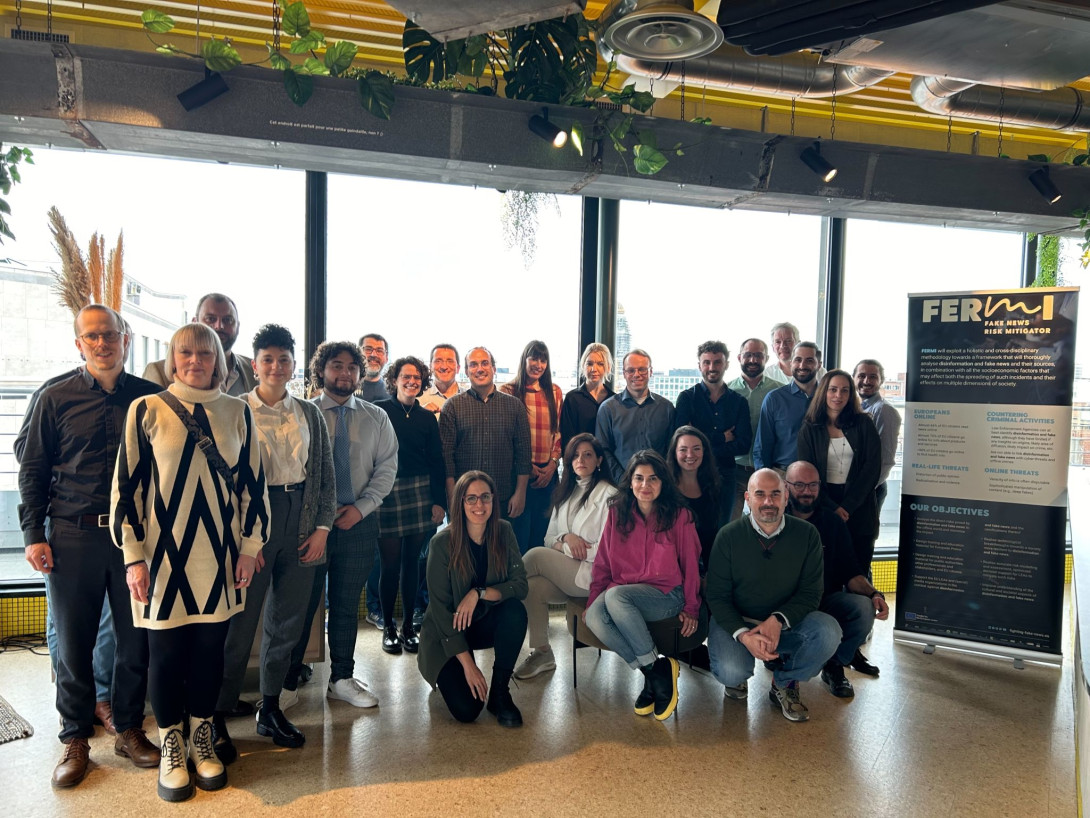
In accordance with its schedule of holding biannual in-person consortium meetings, the FERMI partners gathered in Brussels on 21 March 2024. The meeting was hosted by the Lisbon Council (LC), the FERMI project’s dissemination manager, and took place at Comet Meetings Louise.
The consortium meeting coincided with the end of reporting period one. Thus, the FERMI partners used this half-way point to take stock of the progress and achievements so far and to lay the ground for FERMI’s upcoming interim review in May 2024.
The FERMI Platform and its different components
One of the gathering’s highlights was the demo of the FERMI platform, an integrated version of all key technology offerings and the project’s key output. The demo was held by Giorgos Stamatis from Information Technology for Market Leadership (ITML), FERMI’s technical manager, and served as an opportunity to gather feedback from all partners. As law-enforcement agencies (LEAs) are the platform's primary end-users, it was especially important to get input from the consortium partners representing LEAs. The overall feedback was very positive and constructive, paving the way for further improvement of the platform and tailoring the platform to LEAs’ needs.
Work Package three (WP3) task leaders presented their progress on the key technological components that power the platform. These components include (1) the Dynamic Flows Modeller, estimating the crime landscape in the aftermath of online disinformation campaigns, (2) the Spread Analyser, identifying the spread of disinformation messages and their influence and distinguishing between messages that most likely have been shared by humans or bots, (3) the Community Resilience Management Modeller, assessing the resilience of communities to disinformation, (4) the Swarm Learning module, designed to fine-tune estimates of the crime landscape using data from LEAs without the need to share such data between them, (5) the Behaviour Profiler and Socioeconomic Analyser, gauging the likelihood and severity of the costs of politically motivated crimes caused by disinformation campaigns, and (6) the Sentiment Analysis module, analysing the sentiments of the social media messages at hand.
Work on all technical components is already advanced enough to integrate them in the platform and meet both the WP3 tasks descriptions and Grant Agreement obligations. Similarly, the Technical and Innovation Management is also on track to meet all obligations. The few outstanding issues that will be addressed over the next few months relate to the validation of the platform’s tools in the three pilots and the availability of data.
Validation and communication, dissemination and exploitation
The pilots also feature prominently in a revised and amended experimentation protocol that includes a detailed plan on carrying out the platform’s validation. The pilot leaders, the Finnish Ministry of the Interior, Police Fédérale Belge and Bavarian Police Academy, together with LEA and tech partners signed off on a gradual concept of tailoring the use cases to the subsequent testing of the platform’s different components. Pilots one and two, aiming to validate the Spread Analyser and the Sentiment Analysis module, Dynamic Flows Modeller and Swarm Learning module respectively, will be carried out in the spring and early summer of 2024. The third pilot, which aims to validate the Community Resilience Management Modeller and the Behaviour Profiler & Socioeconomic Analyser, will be held in the early autumn of 2024.
Moreover, the project’s communication, dissemination and exploitation activities were discussed. Some communication and dissemination efforts, especially those regarding the FERMI website and social media activities, have already exceeded the key performance indicators the consortium is required to reach over the course of the project. In FERMI’s second half, a stronger emphasis will be placed on exploitation now that the integrated platform is available.
General Assembly and ethics workshop
Two further agenda items concerned the consortium’s official General Assembly meeting, where, amongst other things, the partners coordinated on their publication plans and the likely impact of the European Artificial Intelligence Act but no formal decision was required. Project partner CONVERGENCE seized the opportunity of having all partners gathered in one place to hold an internal ethics workshop. Dimitra Markopoulou from Vrije Universiteit Brussel (VUB), FERMI’s ethics advisor, gave a presentation on ethics norms and principles. The workshop was part of FERMI’s training obligations and informed by VUB’s outline of ethics guidelines, including an Ethics Protocol signed by all partners. A subsequent feedback indicated that the workshop improved participants’ understanding of ethics requirements.
The next consortium meeting is pencilled in for late September 2024.